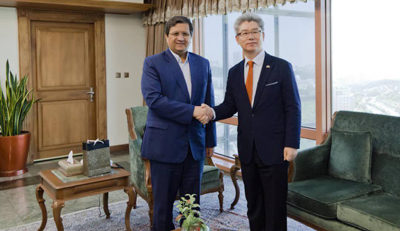Central Bank of Iran (CBI) has urged South Korea to allow Tehran to use its deposits in that country’s banks.
“The main and initial source of those deposits are very clear and there is no reason that [South] Korean banks prevent Iran from using its own financial sources due to the US sanctions,” CBI Governor Abdolnaser Hemmati told South Korean Ambassador to Iran Jeong-Hyun Ryu on Tuesday.

Central Bank of Iran (CBI) Governor Abdolanser Hemmati, left, shakes hands with South Korean Ambassador to Iran Jeong-Hyun Ryu in Tehran on Tuesday, 28 May. CBI.ir
Hemmati went on to harshly criticise Seoul’s “unbearable obstructionism”, expressing expectation that South Korean authorities take measures to resolve “this problem”. “This is while Iran has access to its funds in other countries,” he stressed.
Hemmati was referring to the accounts in which the money for Iranian energy products purchase has been deposited in South Korean banks.
Iran has not been able to access them after the US withdrew from the Iran nuclear pact and reimposed sanctions on Iran, targeting international banking ties with Tehran.
The South Korean envoy noted that he will do whatever he can to facilitate trade and financial exchanges between the two countries.
South Korea was one of the eight countries that were given waivers to keep buying Iranian energy after the secondary sanctions were put in place in November.
Earlier, Jeong-Hyun Ryu had said his country would continue talks with the US to obtain new waivers.
Despite the South Korean government’s interest in maintaining normal trade ties with Iran, banks in that country refuse to process Iranian transactions, the general secretary of Iran-South Korea Joint Chamber of Commerce said Monday, Financial Tribune reports.
“South Korea’s ambassador to Iran has announced willingness to maintain trade ties with Iran, but in practice nothing has happened,” Pouya Firoozi told IRNA.
“At times the government in Seoul tried direct intervention but to no avail as Korean banks consider the interest of their shareholders and refuse to transfer money” to or from Iran, he complained.
Firoozi said the chamber is doing all it can to maintain pharmaceutical trade with South Korean firms.
He also complained that the Export Guarantee Fund of Iran (EGFI) has not offered any support for Iranian traders dealing with South Korean companies.
Earlier in May two Korean banks stopped offering services for trade with Iran in the follow-up to the US move to eliminate sanction waivers to Iranian oil importers.
Woori Bank and the state-run Industrial Bank of Korea (IBK) suspended won-denominated accounts held by the Central Bank of Iran for use in bilateral trade.
The CBI accounts at Woori and IBK had been used to pay for not just oil imports but also trade exempt from the new US sanctions.
In 2010, Woori Bank and the IBK opened their won-based accounts at the CBI so that Iranian buyers could pay Korean sellers by depositing rial with the CBI and Korean exporters could receive their money by withdrawing won from Korean banks linked to the CBI.
In return, Korean importers deposited won into Woori and IBK accounts at the CBI when they imported oil and other goods from Iran.
Iran-South Korea non-oil trade reached $2.5 billion during the first eight months of previous fiscal to November 21, 2018, with Iran accounting for $853 million in exports to South Korea and importing goods worth $1.7 billion from the Asian nation.
Iran mainly exported gas condensates, chemicals and copper concentrates to South Korea during the period. Imports mainly included auto parts, cellphones, paper, and electronic parts.